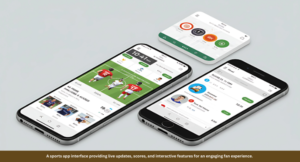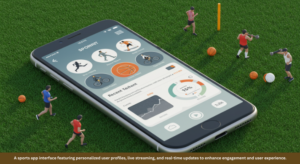The rapid expansion of mobile technology has significantly transformed how fans engage with their favorite sports. No longer limited to television or radio broadcasts, modern-day sports enthusiasts expect real-time access to scores, commentary, updates, and streaming, anytime, anywhere. This is where a sports app comes into play, bridging the gap between the live event and the digital user experience. Whether it’s a feature-rich live sports app that streams matches as they happen or a real sports app that allows users to track stats, book tickets, and follow their favorite players, these platforms elevate fan interaction to new heights.
The popularity of sports app development has skyrocketed in recent years, thanks to the growing demand for dynamic, user-centric mobile solutions. Organizations ranging from professional leagues to local sports clubs are now turning to sports app development services to enhance audience engagement, offer value-added features, and create revenue-generating opportunities. These apps not only deliver live content but also build a sense of community among fans through integrated social features, sports games, and notifications.
What is a Sports App Development?

Sports app development refers to the end-to-end process of designing, developing, and deploying mobile or web-based applications that serve the needs of the sports ecosystem. These applications are purpose-built for a wide range of users, ranging from casual fans and sports league players to professional teams, clubs, event organizers, and sports agencies. A well-executed sports app is designed to deliver timely, relevant, and interactive content such as real-time match updates, live sports app streaming, team statistics, social feeds, sports competitions, ticket booking systems, merchandise stores, and more.
Modern sports app development services take into account various user journeys, ensuring the app is not only feature-rich but also optimized for performance and scalability. From enabling push notifications for live match alerts to offering in-depth analytics dashboards for user insights, these apps function as powerful tools for both engagement and monetization. Given the diverse scope of functionality from streaming and score tracking to fan forums and e-commerce, it’s common for these platforms to combine multiple modules under one digital roof.
Behind the scenes, successful sports mobile app development depends on a strong technological foundation. This includes selecting the appropriate tech stack, ensuring a robust backend architecture for seamless data flow, and designing an intuitive, responsive frontend that keeps users engaged. This intricate balance between frontend and backend development aligns with best practices explained in the backend vs frontend development discussion, where a seamless user interface is supported by high-performance infrastructure.
Choosing the best sports app development company is essential, especially when planning long-term scalability and integration with third-party APIs such as live score feeds, video streaming platforms, payment gateways, or AR-based fan experiences. With a well-executed development strategy, your real sports app can serve as a digital extension of the stadium experience, keeping fans connected before, during, and after every game.
Benefits of Developing Sports Apps

Sports apps have become a cornerstone of modern sports app development services, offering a blend of real-time sports data, interactive entertainment, and business scalability. Their increasing popularity stems from the way they engage users beyond passive viewing, turning every match into a strategic game of skill and prediction. Whether embedded in a live sports app or offered as a standalone platform, sports features provide compelling value for both end-users and organizations.
Revenue Generation
One of the most significant benefits of sports platforms is their multiple monetization avenues. These apps generate income through user subscriptions, entry fees for private contests, in-app purchases like power-ups, and advertisement placements during peak usage hours. When built using scalable architecture, as discussed in the app development cost 2025 guide, sports platforms can handle a growing user base without sacrificing performance, allowing consistent and predictable revenue growth even during high-demand sports seasons.
Sponsorships and Brand Partnerships
Sports apps attract high user engagement, making them ideal environments for brands seeking strategic sponsorship opportunities. From banner placements to sponsored leagues and branded rewards, companies can tap into the app’s ecosystem to engage with a dedicated sports audience. As seen in the evolution of real sports apps, the immersive environment of sports platforms enables brands to leave a lasting impression, especially during major tournaments where user activity spikes.
Acquisition and Retention of Users
Gamification elements such as team selection, scoring algorithms, performance-based rewards, and leaderboards make sports apps addictive and sticky. They attract new users during high-profile events and keep them coming back with features like season-long leagues and weekly challenges. Much like the strategies used in car rental app development to build user loyalty, sport apps’ personalized experiences and engagement incentives significantly improve retention metrics.
Data Profitability
Sport apps serve as rich repositories of user behavior data, including player preferences, activity timelines, engagement levels, and spending habits. This data can be analyzed for business intelligence, used to tailor in-app content, or shared (ethically and securely) with advertisers and partners to enhance personalization. Such data-centric strategies align with the approach taken in backend-heavy systems, where analytics drive strategic decisions, particularly within advanced sports mobile app development frameworks.
Market Development and Worldwide Presence
A well-designed real sports app with integrated Sports app features transcends geographic boundaries. Sports fans from across the globe can join standard leagues, compete against friends or strangers, and follow international tournaments in real-time. This global reach increases the app’s user base and enables broader brand expansion, affiliate partnerships, and diversified ad revenues. Sports apps, therefore, play a pivotal role in expanding a brand’s presence in untapped international markets.
Innovation and Diversification
Sports platforms thrive on innovation. Features like live player substitution, predictive analytics, dynamic scoring updates, and AR-based player cards elevate user engagement levels. These features require a strong backend infrastructure capable of real-time data processing and customization, mirroring solutions discussed in backend development services. As users demand more personalized and immersive experiences, developers must continuously diversify app functionality, keeping the product fresh, competitive, and technologically ahead.
Grow your business with custom sports app development boost engagement, revenue
Enhance services, boost fan engagement, and streamline operations with custom sports app solutions.
Features of a Sports App

Creating a successful live sports app involves more than just offering real-time updates. It requires delivering a well-rounded, engaging experience that meets user expectations and business goals. Modern sports app development incorporates various tools and functionalities to enhance user interaction, streamline operations, and increase monetization. Whether for a local club or a global league, these features make the app intuitive, reliable, and exciting for users.
User Profile
The user profile serves as the gateway to personalization. It allows fans to follow specific teams or players, manage preferences, track performance in sports leagues, and configure alerts and notifications. A well-designed profile enables the app to tailor content, push notifications, and recommendations based on individual interests. Advanced options like avatar customization, saved searches, and usage stats can help enhance user identity and deepen their connection with the platform.
App Analytics
Understanding how users interact with an app is essential for refining its performance and long-term success. Through built-in app analytics, developers and businesses gain actionable insights into usage patterns, top-performing features, and retention metrics. When supported by an advanced enterprise development solution, these analytics tools go beyond basic data collection; they enable continuous improvement of app design, functionality, and marketing focus. This combination ensures every app iteration is grounded in real user behavior, leading to smarter decisions and more satisfied users.
High-Quality Live Streaming
Streaming live games in high definition has become a standard feature in any sports app. Users expect instant access to live matches, along with smooth video playback, real-time score overlays, and the option to pause, rewind, or replay key moments. Features like multiple camera angles, audio commentary, and integration with smart TVs or casting devices can significantly elevate the viewing experience. To retain users, the app must ensure low latency and high-quality video delivery even under varying network conditions.
Ticket Booking
In-app ticket booking adds convenience for users by allowing them to browse upcoming matches, view seating plans, select their preferred spots, and complete payment, all in one place. This feature simplifies the ticket purchasing process and helps sports organizations manage attendance more efficiently. Add-ons like digital ticket wallets, match-day reminders, and promotional offers can enhance the experience further while encouraging early bookings and higher conversions.
News and Updates
Timely and relevant news is essential for keeping users engaged. A dedicated news section can include real-time match previews, transfer updates, injury reports, player statistics, and post-match analyses. Push notifications for breaking news or score alerts can be customized based on user preferences. A dynamic and regularly updated news feed ensures users keep coming back to the app, not just on game days, but every day.
Types of Sports Apps
Sports app development covers several categories, each designed to meet different fan expectations. By offering focused features, these apps enhance user satisfaction and allow sports brands to target specific market needs effectively.
Sports Live Streaming Apps
These apps offer real-time match coverage, interviews, and behind-the-scenes content. With features like HD streaming, multi-angle views, replays, and live chat, they provide an immersive experience. Monetization is achieved through subscriptions, ads, or exclusive content access.
Apps for Scoreboards
Scoreboard apps deliver real-time updates, match timelines, and statistics in a lightweight format. They’re perfect for fans who want quick, data-driven insights without streaming video. Notifications and custom alerts keep users updated on the go.
Apps for Tickets
Ticketing apps simplify the process of browsing schedules, selecting seats, and completing secure payments. Features like digital ticket storage, reminders, and promo codes enhance user convenience while providing event organizers with direct customer access.
Sports Apps
Sports apps let users create teams, compete in leagues, and earn points based on real match outcomes. With features like leaderboards, in-app rewards, and real-time updates, they offer high engagement and strong revenue potential through ads and subscriptions.
Conclusion
The evolution of mobile experiences has redefined how fans interact with sports, and sports app development now plays a central role in driving that transformation. From live sports apps delivering real-time match coverage to sports platforms creating engaging, gamified environments, these solutions are reshaping fan engagement across every level. With the right features, personalized user profiles, analytics, ticketing, and streaming, organizations can connect with audiences globally, increase revenue, and build long-term loyalty.
Investing in tailored sports mobile app development not only meets rising consumer demand but also aligns with a broader digital strategy that spans industries. As explored through insights in Digital Software Labs blogs, the impact of specialized mobile app development is evident across sectors, from logistics to entertainment. The sports industry is no exception. By leveraging scalable technologies, intuitive UI/UX, and monetization opportunities, businesses can transform their apps into powerful digital assets that drive engagement and growth in an increasingly connected world.
FAQs:
A sports app is a mobile or web-based application designed to deliver sports-related content and services to users in real time. These apps can include live sports app streaming, score updates, sports leagues, ticket booking, and team or player tracking. Built through specialized sports app development, these platforms cater to fans, teams, leagues, and organizations looking to boost engagement, streamline operations, and monetize their offerings.
Sports apps are highly profitable when designed with scalable features and monetization options like ads, in-app purchases, subscriptions, and brand partnerships. Major revenue drivers include sports apps, live streaming services, and ticketing integrations. Profitability also depends on how well the app is structured at its core. Strong, efficient backend development ensures smooth data flow and real-time updates, both essential for high-performing sports platforms that retain users and generate recurring income.
Sports app development costs vary based on complexity, feature set, and supported platforms. Essential apps with limited features start around $20,000, while comprehensive solutions with live streaming, analytics, and ticketing can exceed $100,000. Choosing the right tech stack and development team significantly impacts quality and cost. Investing in experienced mobile development services is essential for seamless functionality across devices to ensure performance and scalability throughout the app lifecycle.




